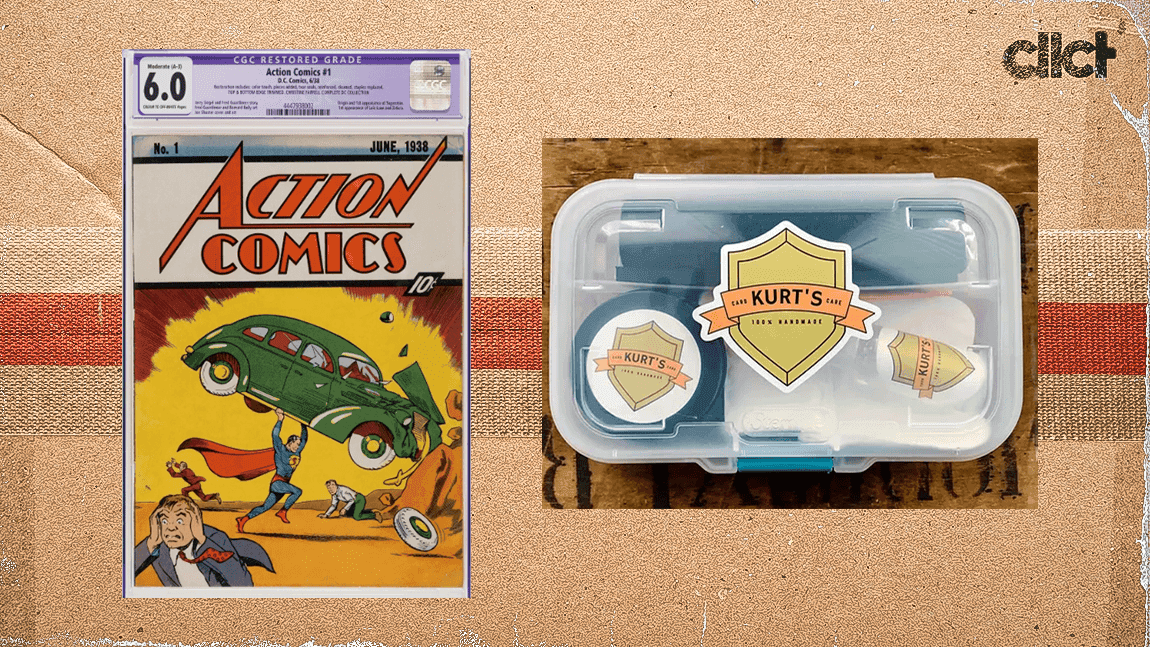As the grading of collectibles has come to the forefront, a cottage industry has arisen from restorers who help collectors get better grades.
A jump of a few grades could mean tens of thousands of dollars for valuable vintage items.
Two of the pioneers in this space were Matt and Emily Meyers, who left their jobs to start Investment Grade Books (IGB) more than a decade ago and became experts in helping collectors earn higher grades for comic books.
In the card space, there's Kurt Colone, who sells Kurt's Card Care, a kit that includes a spray collectors soak their cards in to get rid of stains before submitting them to graders.
But some of the top graders have butted heads with prominent restorers.
PSA has been known to deactivate cards it knows were submitted after the use of Kurt's Card Care products.
CGC was in an eight-year legal battle with IGB, a fight it lost in July 2024, resulting in a $10 million judgment against the grading company.
Colone's fight with PSA is fairly cut and dry.
Colone has not disclosed what is in his products, and PSA has a guarantee the grade it gives will always be that grade. Because PSA guarantees the grade over time by paying out if that isn't the case, the compnay must be sure the item won't degrade. Not knowing what is in Colone's products makes that impossible, PSA reasons.
"I’ve always had safety data sheets on my website that disclose specific chemicals, but I don’t have every ingredient or teach the recipe," Colone told cllct. "Just like any proprietary blend — kind of like brewing beer."
The Meyers case is significantly more complicated.
Whether their lawsuit will affect the future relationship between restorers and grading companies will depend on how the hobby interprets the outcome of that case.
In December 2016, the Meyers sued CGC, alleging after meeting with CGC's main grader, Matt Nelson, on how to be best-in-class at upgrading comic books, Nelson turned against them. The Meyers claimed CGC didn't award grades it should have and publicly defamed their work, compromising their business.
CGC said it didn't defame the couple, rather they told the truth that their comics were harder to grade due to their heavy color touch and glossing agents. CGC also argued grades from a competing grader reflected that.
The jury agreed Nelson did knowingly and maliciously put false information about IGB on a hobby message board by calling the Meyers' works recreations. The plaintiffs said it was Nelson telling the world their works were fake.
"There was nothing 'non-traditional' about our restorations," Matt Meyers told cllct. "We use the exact same materials that have been accepted within the hobby for decades. We spend a tremendous amount of time focused on precision and delicacy."
To prove CGC had an agenda, IGB directed the jury to an email found in discovery from Paul Litch, a grader at CGC, that called one of IGB's books "fake" to Heritage Auctions.
CGC said future emails between the Meyers and Heritage and between CGC and Heritage indicated nothing to suggest it affected IGB's business.
The jury disagreed and awarded the Meyers $10 million — $5 million for reputational and economic damages and $5 million for punitive damages.
CGC, whose legal team declined to comment for this story, was denied a motion for post-trial relief in November, but still has potential avenues for appeal.
But does the IGB case set any precedent for restorers versus graders?
"We hope that more restorers have the confidence to emerge," Matt Meyers said. "Competition breeds new ideas and better results, only making the market stronger."
What the case will likely guarantee is, graders will now stay away from tacit interaction with restorers and also will likely avoid publicly talking about them.
The question is whether grader notes — which the Meyers used to demonstrate didn't contain anything meaningful to lead to the grades they received — will be pared back or eliminated altogether.
CGC has had that feature for many years as a measure of transparency, and PSA just rolled out the grader notes to a select group.
However, if certain omissions in grader's notes that are not complete become grounds for lawsuits, things could change.
Darren Rovell is the founder of cllct.com and one of the country's leading reporters on the collectibles market. He previously worked for ESPN, CNBC and The Action Network.

